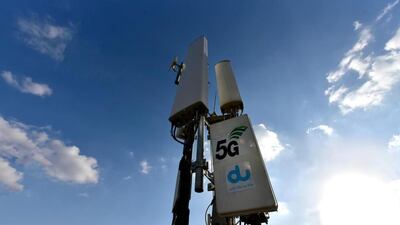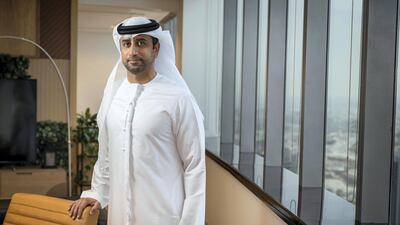Emirates Integrated Telecommunications Company – also known as du – will continue to inject capital into strengthening its network and its digital transformation to build capacity for a pandemic-led communications boom.
The UAE's second-biggest telecoms operator has committed 19.7 per cent of its quarterly revenues to capital expenditure on an ongoing basis, Fahad Al Hassawi, acting chief executive of EITC, said.
Focus areas for investment include digital transformation, core network improvements and a 5G rollout.
"Digital transformation was always our priority but the pandemic has accelerated our focus and the pace of momentum," Mr Al Hassawi, told The National in an interview.
The Covid-19 pandemic led to a steep demand in telecoms services last year as offices switched to remote work and schools shifted to online learning. A steady investment in capex partially helped du, which also registered an increase in traffic, to comfortably deal with the pandemic-induced communications boom without straining the telecom operator’s infrastructure.

“The traffic that we handled during the pandemic has never been seen on our fixed-line networks before but we were very comfortable ... we were prepared ... it didn’t create any issue for us,” Mr Al Hassawi said.
The company’s capex stood at Dh568 million ($154.7m) during the first quarter, almost 83 per higher than the amount allocated during the same period last year.
Du declared a 28 per cent fall in net profit of Dh257m for the first three months of the year, compared to the prior year period. However, profit more than quadrupled compared with the fourth quarter of 2020 on the back of an improving economy.
"Du is on right track to recovery … we reported three quarters in a row with increased bottom line. We increased our customer base in the first quarter of this year … we are successfully capitalising on all opportunities," Mr Al Hassawi said.
"All these are strong signs of recovery… there’s still work that needs to be done but we are seeing a light at the end of the tunnel," Mr Al Hassawi said.
He expects a "gradual but steady" recovery this year.
"It is very difficult to predict when business will reach the pre-pandemic levels … some expect it within two-to-three years while some predict three-to-four years’ time."
He remains “very optimistic” about the future, saying telecoms is a key component of everyone’s life.
“Mobility is increasing with the hospitality sector opening up, international tourism improving and people adapting their lives to new situation. There has been a strong push from physical to online transactions … this is going to be the story for the rest of the year,” he said.
Founded in 2005, du is 50.12 per cent owned by Emirates Investment Authority, 10.06 per cent by Mubadala Investment Company and 19.7 per cent by Emirates International Telecommunications, with the remainder of shares in public hands.
In January, the operator also increased its foreign ownership cap from 20 per cent to 49 per cent to attract more external investors.
Du, which became the second service provider in the region to announce the availability of fifth-generation network in 2019, is currently offering 5G connectivity to nearly 80 per cent of the populated areas in Dubai and Abu Dhabi.
A lower penetration of 5G-enabled devices has been one of the hindrances to a wider rollout in less densely populated areas, Mr Al Hassawi said.
“We are not worried about the number of 5G sites or towers but what we care about is the coverage of population.”

“Penetration of 5G handsets in the market is small … the network is ready to receive 5G traffic, but there are not many supporting handsets. Du is offering its customers to upgrade their handsets through direct purchase or easy instalment plans,” Mr Al Hassawi said.
Besides mobile use cases, du is exploring the importance of 5G in other areas including home broadband, ICT, data mining, and autonomous driving, he added.
5G, which refers to fifth-generation wireless networks, will be almost 10 times faster than the 4G network. Its speed will enable real-time video streaming and better gaming experiences and augmented reality services, as well as safe autonomous transport.


